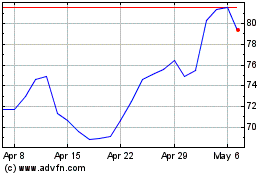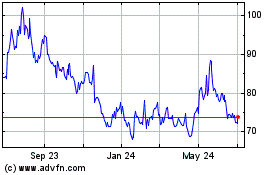Today's Top Supply Chain and Logistics News From WSJ
September 26 2017 - 7:09AM
Dow Jones News
By Paul Page
Sign up: With one click, get this newsletter delivered to your
inbox.
Labor tensions in expedited transport are heating up as the fall
shipping season gets underway. Atlas Air Worldwide Holdings Inc. is
accusing unionized pilots of causing "widespread and significant"
flight delays with a work slowdown, the WSJ's Imani Moise reports.
The freighter operator, which this year struck a jet-leasing and
investment deal with Amazon.com Inc., is asking a court to order
the Teamsters union to end what Atlas says is an illegal job action
that includes last-minute sick calls and refusal to work overtime.
The dispute is similar to one last year between pilots and Air
Transport Services Group Inc., another cargo flier that works
closely with Amazon. The airlines and their customers -- including
United Parcel Service Inc. Deutsche Post AG's DHL and FedEx Corp.
-- are trying to meet increasingly tough delivery demands that come
with the growth in e-commerce. The online sales are pushing out
more packages, but the labor unease suggests they're also adding
strains to expedited networks.
Alibaba Group Holding Ltd. is putting new financial weight
behind its logistics business. The Chinese e-commerce giant is
spending $800.8 million to take majority control in Cainiao Smart
Logistics Ltd., the WSJ's Alyssa Abkowitz reports, and plans to
invest another $15.1 billion over the next five years to expand its
delivery capabilities and the automation in its fulfillment
operations. The plan carries potentially important implications for
Alibaba's international growth plans that go beyond the
distribution networks, however. Taking full control could allay
concerns over financial transparency that drew the attention of
U.S. securities regulators last year. Alibaba is highly profitable,
but it doesn't count Cainiao's losses or include its assets on its
balance sheet. It will also give Alibaba more control over
logistics and customer data as the company looks to expand its
reach outside China with investments in Southeast Asia and
India.
Unilever PLC, like other consumer-products suppliers, is trying
to put the best face on its business prospects. The Anglo-Dutch
group is buying Carver Korea, a Seoul-based provider of skin-care
products, the WSJ's Saabira Chaudhuri reports, in its ongoing push
to pivot into higher-growth sectors and get more of the big but
potentially problematic Chinese market. The $2.7 billion
acquisition is Unilever's biggest in seven years, one measure of
the urgency among consumer-goods suppliers in a changing retail
environment. E-commerce has cut into sales at the traditional
storefronts that sell consumer staples, and many retailers are
trying to prop up their profit margins by moving toward their own
brands. China is a beckoning market to Unilever, which lags in
sales there, but there also are geopolitical clouds over the
business: tensions between South Korea and Beijing have been
growing, making Unilever's move into China through Seoul a risky
path.
RELIEF LOGISTICS
Workers at Puerto Rico's main airport are trying to restore
operations to the island's main lifeline to the outside world. A
trickle of flights is moving through the airport following the
devastating damage inflicted by Hurricane Maria, the WSJ's Jose De
Cordoba and Arian Campo-Flores report, most of them military and
aid flights bringing in critical supplies from power generators to
drinking water. The struggle at the airport, which is operating
with only limited radar and communications equipment, is part of
the broader battle in Puerto Rico after Maria wiped out important
infrastructure. A new estimate said damage from Maria could end up
exceeding that inflicted by hurricanes Harvey and Irma, and it's
crippled relief efforts. Sen. Marco Rubio said the logistics of
getting supplies, equipment and personnel to the airport and ports
remains challenging. Getting relief beyond the sites is just as
difficult: technicians trying to reach a damaged long-range radar
site were using chainsaws to get through two miles of crushed and
impassable rain forest.
This isn't what electronics companies usually mean by a reverse
logistics. Consumer disappointment with Apple Inc.'s new iPhone
offerings is weighing on the shares of key component makers in
Asia, the WSJ's Kevin Kingsbury reports, signaling that concerns
over supplier earnings are rising as hopes for a boost from Apple's
flagship device are fading. Confidence in companies linked to
Apple's supply chain had been riding high. But that excitement has
given way to some disappointment and criticism of the new devices,
and production glitches that have led to shipment delays have added
to the problems. The troubles mark a rare stumble in an Apple
supply chain known for its precision in linking suppliers of
high-value parts and contract manufacturers. Apple has a long reach
in the electronics world, of course, but the impact of the new
iPhones wasn't what suppliers were expecting.
QUOTABLE
IN OTHER NEWS
Oil prices are poised to return to bull-market territory after a
slow climb from their slide three months ago. (WSJ)
Target Corp. is raising its minimum wage as the retailer
competes to fill low-wage jobs in a tighter labor market. (WSJ)
German business leaders warn that the rise of a nationalist
anti-immigration party could hurt the nation's export-driven
economy. (WSJ)
General Electric Co. is selling its industrial-solutions
business to Switzerland's ABB Ltd. (WSJ)
The number of U.S. mergers and acquisitions has grown this year
but deal values have slipped 15%. (WSJ)
Canadian retailers are concerned a U.S. proposal raise the
duty-free threshold on cross-border imports would hurt sales.
(Calgary Herald)
Amazon took a 5% stake in Indian retailer Shoppers Stop Ltd.
(Bloomberg)
The Uber Technologies Inc. UberEats business has been a
surprising success in a competitive food-delivery market. ( New
York Times)
Japan's government raised about $11.6 billion in an offering of
its shares in Japan Post Holdings Co. (Nikkei Asian Review)
The Trump administration named Raymond Martinez, chief
administrator of the New Jersey Motor Vehicle Commission, to lead
the Federal Motor Carrier Safety Administration. (Fleet Owner)
Dockworkers and employers at U.S. East Coast and Gulf Coast
ports are moving closer toward contract negotiations. (Journal of
Commerce)
Iran's shipping line IRISL formed a joint venture freight
business with Kazakhstan's national railway. (Splash 24/7)
Kenya's Mombasa Port will expand its second container terminal
with a $339 million loan from Japan's government. (Standard
Media)
Hawaii will start construction in December of a container
terminal at Honolulu Harbor. (Port Technology)
U.S. and Mexican authorities will start cooperating on joint
cargo inspections at the Otay Mesa crossing south of San Diego.
(American Shipper)
Singapore state investment fund Temasek Holdings took a
significant minority stake in U.K. supply-chain software firm
BluJay Solutions. (Reuters)
Grocer Hy-Vee Inc. will build its first distribution center
outside of Iowa in Austin, Minn. (Des Moines Register)
Liquidators of insolvent Chinese carrier Jade Cargo
International are auctioning three 747-400 freighters on Alibaba's
Taobao marketplace. (The Standard)
ABOUT US
Paul Page is deputy editor of WSJ Logistics Report. Follow him
at @PaulPage, and follow the entire WSJ Logistics Report team:
@brianjbaskin , @jensmithWSJ and @EEPhillips_WSJ. Follow the WSJ
Logistics Report on Twitter at @WSJLogistics.
Write to Paul Page at paul.page@wsj.com
(END) Dow Jones Newswires
September 26, 2017 06:54 ET (10:54 GMT)
Copyright (c) 2017 Dow Jones & Company, Inc.
Alibaba (NYSE:BABA)
Historical Stock Chart
From Aug 2024 to Sep 2024

Alibaba (NYSE:BABA)
Historical Stock Chart
From Sep 2023 to Sep 2024
